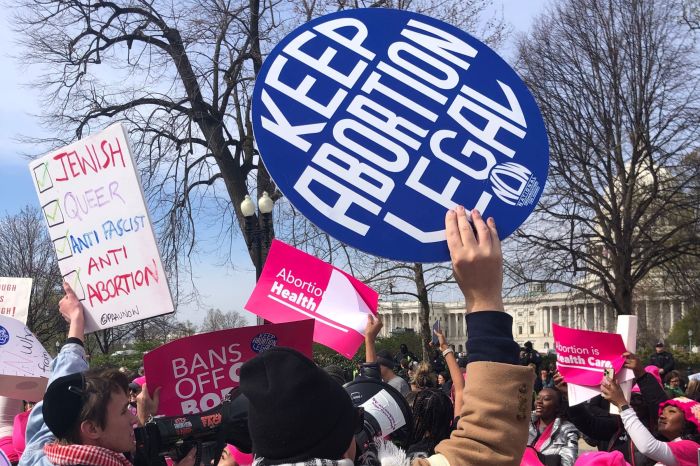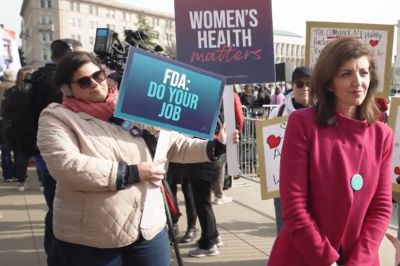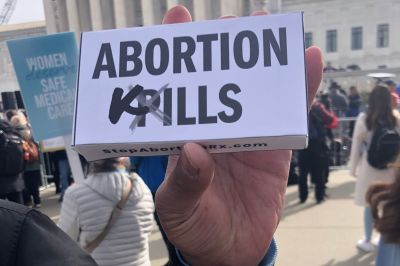Woman whose husband poisoned her with abortion pill speaks out at Supreme Court

WASHINGTON — As the U.S. Supreme Court heard oral arguments on the Biden administration's loosening of abortion pill regulations Tuesday, a woman whose husband was imprisoned for slipping abortion drugs into her drinks in hopes of aborting their child when the couple was going through a separation shared her story.
In an interview outside of the court building with The Christian Post, Catherine Herring said that in March 2022, her husband, Mason, spiked her drink with abortion drugs after she told him she was pregnant.

Mason Herring, a Texas attorney, drew national headlines in February as he was sentenced to 180 days in jail and 10 years probation. He was initially charged with felony assault to induce abortion but pleaded guilty to injury to a child and assault of a pregnant person. Catherine Herring is now opening up about her story with the press as the divorce proceedings are ongoing.
The pair had been married for 11 years and going through a separation at the time of the pregnancy.
"This pregnancy was a complete surprise," she explained. "I found out about a week after he asked to separate that I was pregnant. His first reaction was that this was going to 'ruin his plans' and make him look like a 'jerk.'"
According to Herring, the couple began marriage counseling to work on their relationship. Considering they had started counseling to work on reconciling, Herring said that what her husband then tried to do was a "complete surprise."
On the morning of March 17, 2022, Herring remembers her husband brought her breakfast in bed and instructed her to drink a cup of water, urging her to "stay hydrated" during her pregnancy. Herring said that as she ate breakfast and drank the water, her husband began insisting she drink faster, and he started to grow angry because she was drinking too slowly.
After Herring's husband told her to chug the water because he had to leave for the office, she looked down and noticed the cloudiness of the water. When she asked her husband what had been in the cup, he blamed the filthy water on dirty pipes.
"Or maybe he had grabbed a dirty cup," Herring said her husband offered as another potential explanation. "But he took the cup and, about 30 minutes later, I started getting violently ill. I had severe diarrhea and cramping, and I started bleeding a few hours later."
She had never talked to a pregnancy help hotline before, but on the morning of the first poisoning attempt, Herring suddenly remembered she had seen an article discussing a ban on advertising abortion pill reversal. Herring found the number for the hotline after she googled "abortion pill reversal."
The abortion pill reversal process works by providing progesterone to a woman who has taken the first drug in the chemical abortion regimen. Medical professionals who offer abortion pill reversal contend that, if taken at a certain point, the treatment can potentially save the pregnancy.
"I was able to speak with a nurse," Herring said. "We weren't sure what was in the cup, but we thought that maybe he was trying to do something to harm the baby. [The nurse] recommended that I start a dosage of progesterone."
"And by the grace of God, I already had a prescription in my medicine cabinet from a previous pregnancy," she added. "So, I was able to take the correct dosage immediately."
Herring said that she later went to the emergency room, but her husband never came to visit. After the first attempt to abort her baby failed, Herring told CP that Mason Herring tried to poison her six more times over the course of two months.
She began to gather evidence. With the help of a private investigator, Herring caught her husband in the act on a hidden camera. She took the evidence to the police.
Despite her husband's attempt to abort his child, Herring confirmed that her daughter is alive and is currently 19 months old.
"She suffers from a lot of developmental issues," the mother said. "But she's alive."
The nation's high court heard oral arguments related to a legal challenge concerning the U.S. Food & Drug Administration loosening restrictions on mifepristone, the first drug in the chemical abortion regimen.
Mifepristone works by blocking the progesterone hormone necessary to sustain a healthy pregnancy, and it starves the unborn child to death.
In 2021, the FDA reduced the regulations surrounding mifepristone, allowing women to receive it through the mail without an in-person doctor's visit. Before that, in 2016, the FDA eliminated the requirement for abortionists to report non-fatal chemical abortion complications.
Catherine Herring's story comes amid efforts in Colorado to ban doctors from giving progesterone to women who took the first pill in the abortion pill regimen but wish to keep their unborn child, said to be the first law of its kind in the nation. The law was put on hold last year by a federal judge until a lawsuit against it from a Catholic health organization can be adjudicated.
CP also spoke with Elizabeth Gillette, who told the outlet she ended up on the bathroom floor in a pool of blood after taking chemical abortion drugs.
Fourteen years ago, Gillette faced an unexpected pregnancy and obtained the drugs from a Planned Parenthood in McMinnville, Oregon, that has since been shut down.
Gillette claims the Planned Parenthood staff reassured her that she might experience bleeding that would feel like a "double period" and some cramping, but nothing that should prevent her from going to work the next day.
She told CP that her experience was "far different" from what Planned Parenthood said would happen.
"I ended up in a pool of blood on the bathroom floor, and I ended up holding the transparent amniotic sac with a recognizable baby inside, and I had to flush my baby," Gillette said. "Nobody told me that that was even a possibility. They told me that there would be some clotting."
Gillette said she still suffers from post-traumatic stress disorder 14 years later, and she has been seeking help through counseling for about six years now. She also said that, after the abortion, there was no follow-up care, nor was there a doctor's visit.
"No one cared," she said. "I thought I was going to die, and nobody cared."
"I decided to share my story because my child's life matters," Gillette said. "And because of what I went through, no woman should ever have to go through that. Women deserve the truth. And when people are only hearing half of the story, somebody has to stand up."

Multiple pro-life and pro-choice activists gathered outside of the Supreme Court.
Many held signs warning about the dangers of the abortion pill, while others held signs that read "Safe Abortion Is A Human Right."
Terrisa Bukovinac, founder of Progressive Anti-Abortion Uprising, told CP she was outside the court to "oppose a tool of genocide," referring to the abortion pill.
In response to a question about what she thinks of abortion proponents accusing pro-lifers of forcing their religion on others, Bukovinac, who's a pro-life atheist, stated, "Opposing genocide should cross secular and religious lines."
"Most women are dealing with financial difficulty," Bukovinac said about the women who typically seek to have chemical abortions. "I'm a pro-life progressive, and I believe that we need serious financial safety nets for people who are pregnant and parenting in this nation."
Bukovinac accused the abortion industry of exploiting women and families who feel as if they do not have any other options. She called on the pro-life movement to continue expanding the resources available for pregnant women and to reduce the abortion industry's influence by limiting access to abortion-inducing drugs.
"You can't be anti-fascist, anti-racist and anti-capitalist and support the abortion industry," Bukovinac said.
Caroline Taylor Smith, the executive director of PAAU, told CP that opposing violence is a progressive view and that "abortion clearly is violence." She contends that even if the unborn are typically in an early stage of development when a woman undergoes the chemical abortion regimen, the drugs still poison a human being.
"I think we need to follow science, and we need to learn from history," the PAAU executive director said. "And my conclusion, and the conclusion everyone should have, is that abortion pills need to be removed from society. They're not safe."
Dr. Susan Bane of the American Association of Pro-Life Obstetricians and Gynecologists, an OB-GYN with over 20 years of experience, told CP that the FDA's removal of mifepristone safeguards sends a message to women that "you don't need ongoing healthcare."
"Then that's a message to say that I can just order these online, and this is going to be an easy process," Bane said.
"And then, what I hear from my patients is just the opposite," she added. "They had excruciating pain, and they bled so heavily, and they didn't have the ability to ask questions during their informed consent process, and they didn't have follow-up like they needed."
"They're alone throughout this process, and that is not the standard for how we take care of women in this country," Bane continued.
Julie Marie Blake, senior counsel for regulatory litigation at Alliance Defending Freedom, said the FDA's own label says that chemical abortion drugs send one in 25 women to the emergency room, which could equate to about 25,000 women going to the emergency room last year.
Blake declared women need ongoing care from a doctor when taking drugs that she noted are "high-risk."
"The FDA had no authority and no evidence when it removed crucial safeguards on chemical abortion drugs, such as the ongoing in-person care of a doctor," Blake told CP. "So, we are standing up to hold the FDA accountable. We're asking the Supreme Court to restore these crucial safeguards to ensure that women have in-person doctor care."
Samantha Kamman is a reporter for The Christian Post. She can be reached at: samantha.kamman@christianpost.com. Follow her on Twitter: @Samantha_Kamman




























